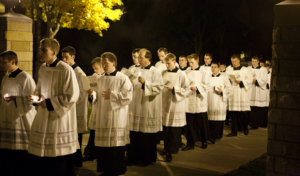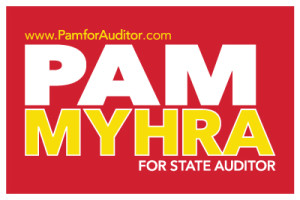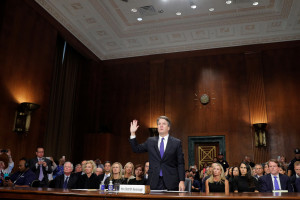EDITOR’S NOTE: In November, I put out a call for statements from priests, ex-seminarians, and ex-seminary staff. I think we, the laity, need to assess what exactly is going on in Catholic seminaries, both good and bad, and this is a space where I’ll allow people who have been there to say whatever they feel needs saying. Thank you to Aidan Toombs for sending me this.
My name is Aidan Toombs, and, until last month, I was a seminarian at Pope St. John XXIII, a national seminary for late vocations near Boston, Mass. I was in my second year of Theology. But, the week before Thanksgiving, I packed up my car with all my belongings and withdrew from seminary, and formation, in the middle of the term.
Last May, I discovered that another seminarian in my class was stealing from me – using my credit card without my knowledge and electronically transferring funds out of my checking account into his credit card account.
The seminary’s response to the theft is an example of the efforts we hear of too often by Church authorities to cover up wrongdoing and focus on blaming the victim, attacking his character and credibility, rather than holding the perpetrator accountable. It’s also an example of the culture of secrecy that apparently reigns in the Church and seminaries today. And that’s why I felt it was important to submit my statement – this needs to change.
After I discovered the theft, I shared the information with my Vocation Director for his guidance as to how to proceed. On his advice, I told the Rector of the seminary what happened. When the other student learned I had told the seminary, he sent me an angry e-mail making vague threats to defame me to the Rector. I didn’t bother to respond to him – I knew I hadn’t done anything that was in any way inappropriate. In fact, I forwarded his e-mail myself to the Rector and my bishop.
I wanted to report the theft from my checking account to the police – because what he did was a crime and he needed to be held accountable. But, my bishop strongly advised that I wait for the seminary to address the issue. So I waited.
Then, just days before seminary was to start this fall, I was shocked to learn that the other student was being allowed to return to seminary. The first day back, the Rector called the student and me to a meeting with himself, the Vice Rector, and the school psychologist. No one told me why we were having the meeting (or why a psychologist needed to be there!). The psychologist questioned me at length about my past generosity to this student. I got the feeling he was looking for nefarious motives on my part, which was very odd. I had been generous with this student, but I had been (and am) generous with everybody.
The psychologist tried to push the other student to take some accountability and make some sort of apology, but he had a really hard time of it. The student was unwilling to admit to any wrongdoing. It went something like this: “Don’t you think it’s wrong to use someone’s credit card to such an extent, and without his knowledge?” “Well, I guess so. I’m sorry if there was a misunderstanding.” As to the theft from my checking account … incredibly, he simply maintained that he had no idea who had transferred the funds into his account! And the Rector and psychologist didn’t bother to challenge his ludicrous non-defense.
Then the psychologist felt compelled to share items from my psychological evaluation (which is a standard part of every student’s application to seminary, and is strictly confidential). He started by saying, “It says in your psychological evaluation that … .” Although the comments he began to share were favorable, having to do with my generous character, he had no right to share any of my evaluation with another student! I stopped him mid-sentence and reminded him that I had not given consent for the sharing of my evaluation with anyone except my diocese and the seminary administration. What this psychologist did (reading aloud from a psychological evaluation to third parties without the consent of the one evaluated) was probably illegal and certainly unethical. The whole meeting was bizarre.
By this time, I had had enough of waiting for the student to be held accountable by the seminary, and was getting the feeling that nothing would be done. I reported the theft to the police, and then gave the Rector a copy of the police report. At this point, I still naively thought the Rector, and the student’s diocese, were interested in discerning the truth. But the Rector’s only comment to me was, “Why are you giving me this?” after which he ushered me out of his office.
I was puzzled. Why wouldn’t the Rector want to know that someone had filed a criminal complaint against one of his students?! And certainly he’d want to know the contents of the police report, for the sake of the safety of his students, not to mention the people of the diocese for which the student was studying. I assumed the Rector would consider it his responsibility to thoroughly investigate any allegations of criminal behavior by his seminarians. But I was wrong.
The student was then charged with a crime by the Weston police, and a date was set for the student to appear in court. I notified the Rector that the student had been charged. And now the Rector put the pressure on. He called me in to his office and told me that the other student had said, some time ago, that I was engaging in specific sexual activity over the summer (i.e., while as a seminarian). These allegations were false, and I saw them as clearly retaliatory and related to the threatening e-mail I had received from the student last summer.
(And think about it – if I were engaging in any illicit activity last summer, and the Rector had known about it, why did it only become an issue once the student was being charged with a crime? Shouldn’t it have been an issue as soon as the Rector learned of it?!)
After dropping this bombshell on me, the Rector dismissed me from his office with the comment that I should let him know if I had any other information about this. I felt that I was now in danger of being dismissed from seminary for sexual misconduct. So I defended myself by submitting testimonials from some longtime business colleagues and old friends who attested to my character, conduct and chastity. (Imagine how embarrassing it was to ask them for this.) The Rector was not happy with the response, however. He said to me, “I didn’t ask you for this,” and, “You shouldn’t have gone public with this.” So apparently, he wanted me to give him more information … but not if it would serve as a defense against the defamatory statements.
I learned that the defamation was also shared with the faculty, because the allegations against me came up in my advising sessions. Both my Formation Advisor and my Spiritual Director at seminary expressed that they had heard the allegations in faculty meetings, and that these allegations created obstacles to my formation. I was left to wonder – who else was in these faculty meetings and heard this about me? I felt self-conscious and embarrassed.
In my next meeting with the Rector (the Vice Rector always attended these meetings as well), the Rector came down on me hard. He clearly wanted me to drop the charges. He literally said that he blamed me for the theft, because of my past generosity to the student (in other words, blaming the victim for bringing the crime upon himself); and, he questioned my credibility, saying it was possible I had completely fabricated the theft in an effort to get the student dismissed because he “had something” on me, referencing the student’s defamation.
But of course the idea that I fabricated the theft (for any reason) was preposterous … he was effectively proposing that I had stolen from myself, and reported the non-theft to the bank by signed affidavit, and abruptly closed my account (thus incurring fees, and costs in buying new checks, etc.), and disingenuously asked my Vocation Director for his opinion what I should do before reporting it to the seminary, and filed a false police report (which is itself a crime) … all as part of a grand scheme to get this guy ejected. And anyway, how could it both be true that it was my fault the student stole from me, and that the theft never happened because I had just made it up? These are mutually exclusive theories. The Rector’s “reasoning” was bereft of logic.
The Rector also said I should never have gone to law enforcement, and that by doing so I had acted in complete disobedience to my bishop and my Spiritual Director. The latter was simply not true; both men had told me they supported my going to the police to report the theft. The Rector was just making stuff up. I tried to correct him but he talked over me. He wouldn’t hear any of it.
And then the comment that was most telling – he said, angrily, “Don’t you understand that if he [the other student] admits to this, he’ll have to be dismissed?!” Now it was all clear. For whatever reason, the Rector wanted that student to remain in formation, regardless of what he had done, and regardless of what the truth was. Indeed, the Rector didn’t want to hear the student’s admission, he didn’t want to know the truth, if it would mean having to hold the student accountable.
The Rector had every reason to believe what I was telling him, and to investigate further. I had given him copies of my bank statements, the police report, e-mails, etc. But he refused to look at the evidence in front of him … and what evidence he did see, he refused to believe. He chose not to investigate allegations of criminal activity by his student, much less to report them to law enforcement.
But doesn’t the Church have a moral obligation to investigate allegations of misconduct by its men, whether priests or seminarians, and to provide to victims, as well as the parishioners and public these men serve, a complete accounting of the misconduct?
Rather than investigating the misconduct, the Rector instead chose to find reasons not to consider my (the victim’s) allegations “credible.” He used a warped version of my (the victim’s) personal life, obtained from the other student’s (the perpetrator’s) unsubstantiated defamatory comments, to discredit me, without permitting me to defend myself. This is something we hear happening again and again – instead of investigating allegations of misconduct, Church authorities attack the credibility of the victim and attack his character.
What is also troubling is that, because this is a seminary for late vocations, that other student is not just a kid out of college. He is a middle-aged man, approximately 40 years old! And here he is, a “man of the Church” in formation to become a priest, using others’ credit cards to support his lifestyle, taking money out of their checking account to pay his credit card, lying about his actions and lying about the others’ character to protect himself. He is financially irresponsible and he is dishonest. And the Rector (and the student’s diocese) knew all this.
Also troubling is that the seminary is not following the stated, “consistent” policy of the Archdiocese of Boston regarding the reporting of criminal activity to law enforcement. The statement by Cardinal Sean O’Malley on seminary review that was posted on the archdiocesan website on October 11, 2018 states: “if potential criminal activity is discovered [at any seminary in the Archdiocese of Boston], you can be assured that it will be promptly referred to law enforcement, as has been the consistent policy of the Archdiocese of Boston with any allegations of criminal issues.” Well, that sounds nice, but my allegation of criminal issues was not “promptly referred to law enforcement.” Just the opposite: I was not only chastised for referring criminal activity to law enforcement myself, but, in addition, my credibility and character were attacked, and I was pressured to drop the charges that were brought by law enforcement.
After all of this happened, it was clear to me that my life in seminary would be hell if I didn’t drop the charges. Also, as I was still a seminarian, the virtue of obedience was used to pressure me to do so. And so I dropped the charges.
I remained in continual distress, however, and could not find peace in the seminary in light of all that had happened, especially what the student had said about me. I felt that my dismissal from seminary was a constant possibility. The other student’s lies and defamation of my character had not only been given credence by the Rector, but as I mentioned, they made their way to other faculty, and also to my bishop. Thus, they damaged my credibility and my standing in the seminary, as well as my prospects in the wider Church and my advancement in the Church.
Ultimately, I felt I had no option but to leave seminary. It is a terrible waste. I really felt that I had a vocation, and it was affirmed on all sides. I had been voted the class president this year, I was a straight A student with excellent evaluations from my pastoral assignments – according to my Formation Advisor, the best he had ever seen. I could have been a good priest.
As to the Rector’s gross mishandling of the theft, the important lesson he gave that other student (who remains in formation for the priesthood at Pope St. John XXIII to this day), is that when you’re caught in wrongdoing you should just deny it, hold fast to your denial, and deflect attention from yourself with false allegations against the victim. If you do that, the Church will protect you. On the other hand, if you report misconduct, especially if you go outside the Church and to the authorities – look what happens.
I still believe in the Church, if not in the people who administer her. But I must admit that it’s difficult to participate in the Church and to practice my faith any more, and my spiritual growth has certainly come to a standstill from this.
I hope that by telling my story some good can come from this, and that perhaps some change can be effected. And I hope that this does not happen to any other seminarian.
Do you have a story, good or bad, to tell about your experience in seminary? For the good of the Church, please reach out to me. –JJH
UPDATE 28 January 2019:
Last week, I received a number of anonymous and semi-anonymous complaints about this story, alleging that Mr. Toombs had concealed, downplayed, or outright lied about important parts of this story in order to destroy the reputation of the seminarian who (allegedly) stole from him. These claims led ChurchMilitant.com (which briefly shared this piece, with Mr. Toombs’ permission) to remove it from their website. Although these claims came from no identifiable source, calumny is an extremely serious charge, so I looked into it as best I could with my concededly limited resources.
I was not able to substantiate any of the claims made against Mr. Toombs, nor were any of the critics willing to go on the record with their disputes against Mr. Toombs’ account. For his part, Mr. Toombs denied categorically all the relevant allegations against him, insisting that the criticisms I received are part and parcel of the same campaign of defamation he describes in this testament. I wish to thank him for his cooperation and candid answers over the past few days as I grilled him on a variety of topics relating to his seminary experience and his past. Since I was not able to substantiate those allegations, I will not recount them here.
Mr. Toombs also shared with me a number of documents — the police report described in this testament, various court filings, and a lengthy sworn statement signed by Mr. Toombs as part of a lawsuit. I carefully reviewed these documents. I found the documents and this testament consistent with one another. It is my understanding that to lie in one of these statements would constitute a low-grade felony. While I am never closed to the possibility that I’ve made a mistake, at this time, I can find no reason to correct or retract Mr. Toombs’s testament.
Despite all that, I would, ordinarily, still be inclined to remove the names of all specific individuals from this piece. In this series, I am trying to get a sense for what is going on in the Church, not publicly name-and-shame individual seminarians and seminary officers, and, if facts are in dispute, there’s no need to keep their names front and center. However, there’s nothing to remove. Mr. Toombs had the same attitude in this piece, thus named no specific individuals involved. I myself did not know the name of the seminarian in question until I reviewed the police report — and, now that I know it, I plan to try very hard to forget it.







